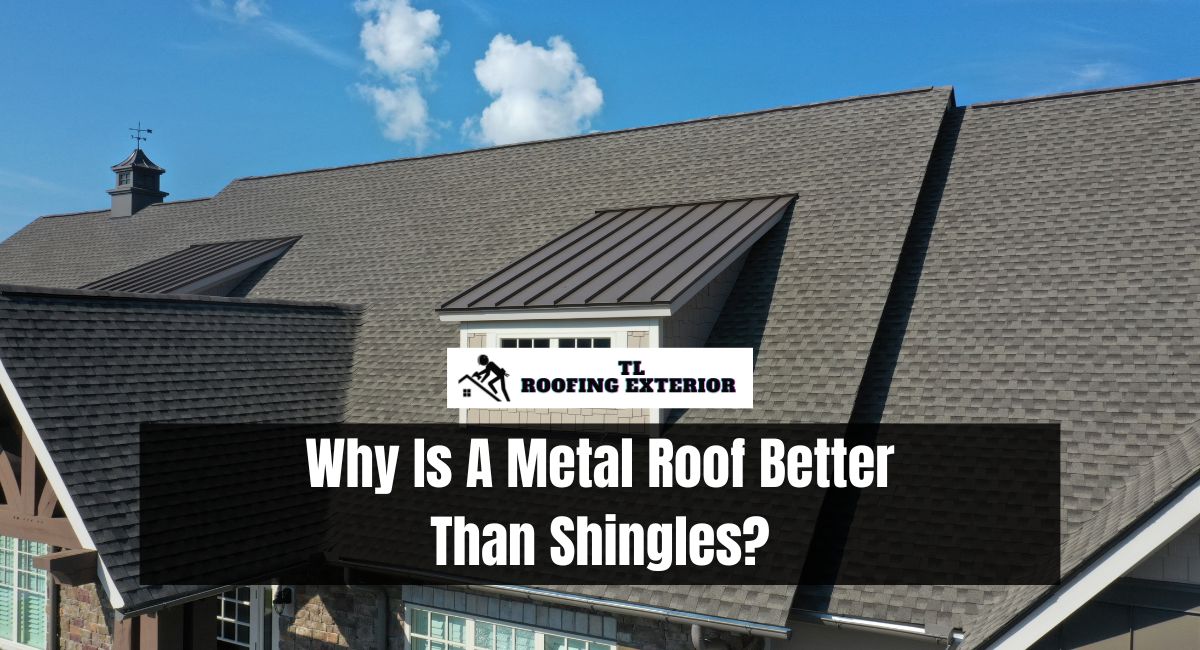Metal and asphalt shingles are two of the most prevalent roofing materials. While shingles have been the standard for many years, metal roofing is gaining popularity for a number of reasons. Both have their advantages, but how do they compare to one another? Is a metal roof truly superior to shingles?
In this article, we will examine the advantages of metal roofing over asphalt shingles, including factors such as durability, energy efficiency, maintenance, and cost over time.
Why Is A Metal Roof Better Than Shingles?
Both metal roofs and shingle roofs have their own sets of advantages and disadvantages, but there are several reasons why some people consider metal roofs to be better:
Longevity
- Metal Roofs: Depending on the grade of the materials and installation, a metal roof can have a lifespan of up to 70 years. This product’s durability makes it a one-time purchase for many homeowners.
- Shingle Roofs: The average lifecycle of an asphalt shingle roof is 20 to 25 years, necessitating replacement at least once or twice during a homeowner’s tenure.
Durability
- Metal Roofs: These roofs are highly resistant to elements such as strong winds, heavy precipitation, and hail. Metals of superior quality are not corrosive or brittle and are impact-resistant.
- Shingle Roofs: Asphalt shingles can be damaged by high winds and are more susceptible to damage from precipitation. They are also susceptible to algae and moss growth, which can impair the structure over time.
Maintenance
- Metal Roofs: In general, metal roofs require less maintenance, which can be a significant benefit for householders who do not want to perform frequent roof inspections and repairs.
- Shingle Roofs: Shingle Roofs require routine inspections for missing or damaged shingles and may also require lichen and algae treatments.
Energy Efficiency
- Metal Roofs: The reflective properties of metal roofing materials can significantly reduce cooling costs, thereby increasing the energy efficiency of a residence.
- Shingle Roofs: Traditional asphalt shingles absorb more heat, which can increase your ventilation costs; however, there are now energy-efficient asphalt shingles available.
Environmental Impact
- Metal Roofs: Typically composed of 30–60% recycled content and 100 percent recyclable at the end of their useful life, making them a more eco-friendly option.
- Shingle Roofs: Asphalt shingle roofs generate millions of tons of waste annually, although recycling programs are beginning to mitigate this effect.
Fire Resistance
- Metal Roofs: As a non-combustible material, metal is a safer roofing choice in areas prone to wildfires.
- Shingle Roofs: Modern shingles are fire-resistant, but they are not as effective as metal in preventing the spread of fire.
Weight
- Metal Roofs: Due to the lightweight nature of metal roofing materials, they are suitable for older residences.
- Shingle Roofs: The weight of asphalt shingles may necessitate additional structural support, especially for larger residences and buildings.
Cost
- Metal Roofs: Metal roofs can be two to three times more expensive than asphalt shingles initially, but their long-term savings on maintenance and durability can make them cost-effective.
- Shingle Roofs: Shingle roofs have a lower initial cost but may be more expensive in the long term due to maintenance and replacement needs.
Aesthetic Options
- Metal Roofs: Modern metal roofing is available in a variety of designs, textures, and colors, including imitations of wood, slate, and asphalt shingles, allowing for aesthetic flexibility.
- Shingle Roofs: While there is a variety of colors and styles for shingle roofs, the options are typically less diverse than with metal roofing.
Resale Value
- Metal Roofs: The longevity and low maintenance of metal roofs can significantly increase your home’s resale value.
- Shingle Roofs: The effect on resale value is typically less significant and can be a disadvantage if the roof is approaching the end of its useful life at the time of sale.
In summary, metal roofs often offer greater durability, longevity, and energy efficiency compared to shingle roofs, although they are generally more expensive upfront. The “better” option will depend on your specific needs, including your budget, aesthetic preferences, and long-term plans for the home.
Is It Better To Have A Metal Roof Or Shingles?
The decision between a metal roof and asphalt shingles is influenced by variables such as budget, climate, and aesthetic preferences. Metal roofs are more durable, fire-resistant, and energy-efficient than asphalt shingles, but they cost more initially. They can last between 40 and 70 years and are more resistant to harsh climatic conditions.
Asphalt shingles are less expensive and simpler to install but typically only last twenty to thirty years. They have a traditional appearance but may require more upkeep. Consider your long-term requirements, the local climate, and your budget when making your selection.
Conclusion
Metal roofing often outperforms asphalt shingles in terms of durability, energy efficiency, and long-term value despite asphalt shingles’ reduced initial cost and more traditional appearance.
Metal roofs can last up to 50 years or more with minimal maintenance, are resistant to extreme weather conditions, and offer energy savings through heat reflection. Metal roofs can be more expensive initially, but their durability and low maintenance requirements often make them the most cost-effective option in the long term.
By comprehending the distinct benefits of metal roofing, homeowners can make an informed choice that best meets their needs, preferences, and budget.
Learn More: What Is The Best Coating For Metal Roof?
